Configure Nagios to Monitor Remote Windows Host
To configure Nagios to monitor a remote Windows host, you’ll need to set up NSClient++ on the Windows Machine. Install Nagios on the ... Read More
Learn more about why Eclipsys has been certified as a Great Place to Work in Canada, Best Workplaces in Ontario and Technology, and named Canada’s Top SME Employer for 3 years!
Learn more!Monitoring the Oracle Database with Nagios involves using plugins and configurations that allow Nagios to check the status and performance of the Oracle Database.
1. Install the libnsl package which is a required package for instant clients for Oracle Linux 8
[root@emcl etc]# dnf install libnsl -y Last metadata expiration check: 1:31:06 ago on Fri 15 Dec 2023 05:26:18 PM EST. Package libnsl-2.28-164.0.1.el8.x86_64 is already installed. Dependencies resolved. Nothing to do. Complete!
2. For downloading instance client goes to the Oracle website https://www.oracle.com/ and does the following
From the top menu go to Resources then click Developer Downloads
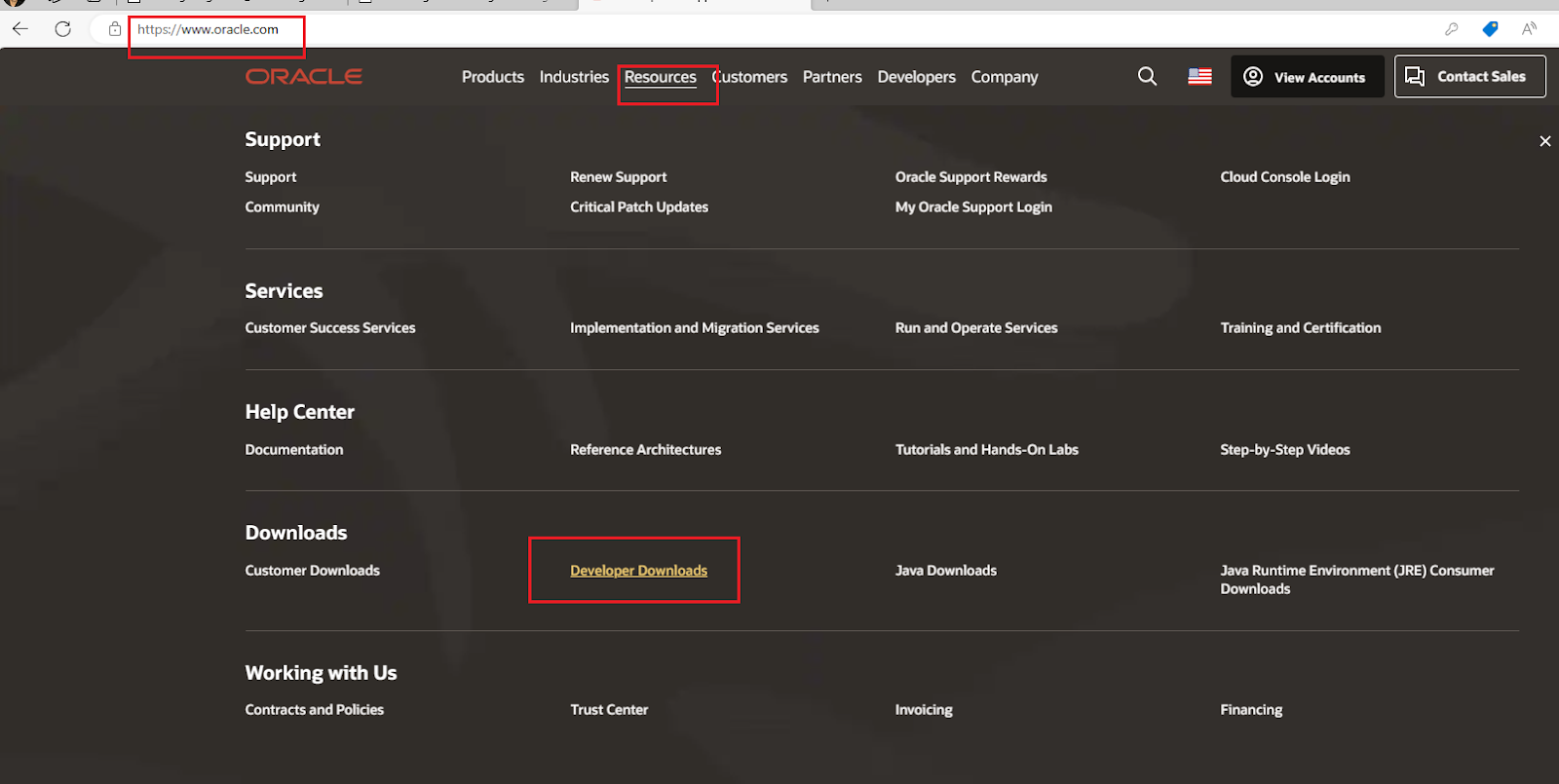
Click Database

Click Instant Client

Then choose Instant Client for Oracle Linux 64-bit
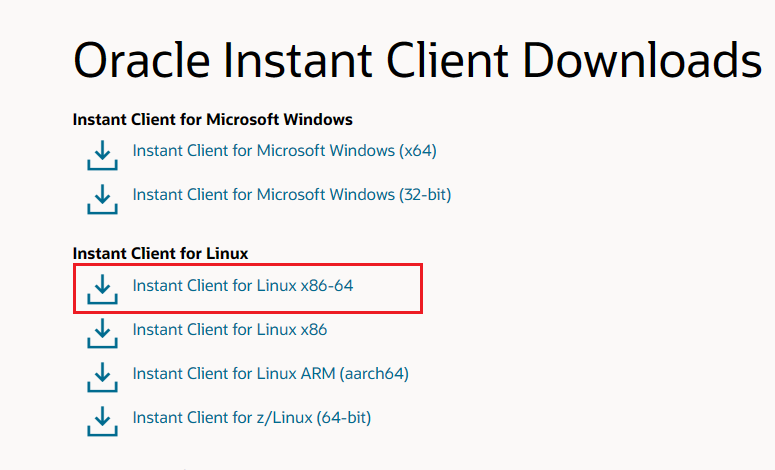
From here you should download these rpm files
Download and copy the rpm file to /software and install them
[root@emcl software]# rpm -qa | grep instantclient [root@emcl software]# rpm -Uvh oracle-instantclient-basic-21.12.0.0.0-1.el8.x86_64.rpm warning: oracle-instantclient-basic-21.12.0.0.0-1.el8.x86_64.rpm: Header V3 RSA/SHA256 Signature, key ID ad986da3: NOKEY Verifying... ################################# [100%] Preparing... ################################# [100%] Updating / installing... 1:oracle-instantclient-basic-21.12.################################# [100%] [root@emcl software]# rpm -Uvh oracle-instantclient-devel-21.12.0.0.0-1.el8.x86_64.rpm warning: oracle-instantclient-devel-21.12.0.0.0-1.el8.x86_64.rpm: Header V3 RSA/SHA256 Signature, key ID ad986da3: NOKEY Verifying... ################################# [100%] Preparing... ################################# [100%] Updating / installing... 1:oracle-instantclient-devel-21.12.################################# [100%] [root@emcl software]# rpm -Uvh oracle-instantclient-sqlplus-21.12.0.0.0-1.el8.x86_64.rpm warning: oracle-instantclient-sqlplus-21.12.0.0.0-1.el8.x86_64.rpm: Header V3 RSA/SHA256 Signature, key ID ad986da3: NOKEY Verifying... ################################# [100%] Preparing... ################################# [100%] Updating / installing... 1:oracle-instantclient-sqlplus-21.1################################# [100%]
1. Creating Nagios user in the database and giving it the required access
[oracle@emcl ~]$ sqlplus / as sysdba create user nagios identified by nagios; grant create session to nagios; grant select any dictionary to nagios; grant select on V_$SYSSTAT to nagios; grant select on V_$INSTANCE to nagios; grant select on V_$LOG to nagios; grant select on SYS.DBA_DATA_FILES to nagios; grant select on SYS.DBA_FREE_SPACE to nagios;
1. prerequisite for installing Check_Oracle_Health on OEL8.5 (our nagios server)
1_1. The installation of the Perl modules DBI and DBD::Oracle are required. perl-DBI.x86_64 rpm exists on OEL8 ISO image and we will install it. In addition, we need to install libaio and Perl-CPAN related RPMs, I checked my system it was already installed.
[root@emcl software]# yum search perl-DBI Last metadata expiration check: 1:04:11 ago on Wed 03 Jan 2024 03:03:33 PM EST. ======================================================== Name Exactly Matched: perl-DBI ========================================================= perl-DBI.x86_64 : A database access API for perl [root@emcl software]# yum install perl-DBI.x86_64 [root@emcl software]# rpm -qa | grep perl-DBI perl-DBI-1.641-3.module+el8.3.0+7665+79fef143.x86_64 [root@emcl software]# rpm -qa | grep libaio libaio-0.3.112-1.el8.x86_64 [root@emcl DBD-Oracle-1.83-0]# rpm -qa | grep perl-CPAN perl-CPAN-Meta-Requirements-2.140-396.el8.noarch perl-CPAN-Meta-2.150010-396.el8.noarch perl-CPAN-Meta-YAML-0.018-397.el8.noarch perl-CPAN-2.18-397.el8.noarch ###Prerequisites: ####Oracle Instant Client: [root@emcl software]# rpm -qa | grep oracle-instantclient oracle-instantclient-sqlplus-21.12.0.0.0-1.el8.x86_64 oracle-instantclient-devel-21.12.0.0.0-1.el8.x86_64 oracle-instantclient-basic-21.12.0.0.0-1.el8.x86_64
The DBD::Oracle Perl module is not in an RPM repository, the good thing is that you can download it via CPAN. Run the following command with the root user.
[root@emcl software]# perl -MCPAN -e shell

During the installation, you may be prompted to provide the paths to the Oracle Instant Client libraries and include files. Make sure to provide the correct paths.
[root@emcl DBD-Oracle-1.83-0]# export ORACLE_HOME=/usr/lib/oracle/21/client64/
[root@emcl DBD-Oracle-1.83-0]# export LD_LIBRARY_PATH=/usr/lib/oracle/21/client64/lib
[root@emcl DBD-Oracle-1.83-0]# export PATH=$PATH:$ORACLE_HOME/bin:$LD_LIBRARY_PATH:${PATH}:/usr/bin:/bin:/usr/bin/X11:/usr/local/bin
[root@emcl DBD-Oracle-1.83-0]# cd /root/.cpan/build/DBD-Oracle-1.83-0
[root@emcl DBD-Oracle-1.83-0]# perl Makefile.PL
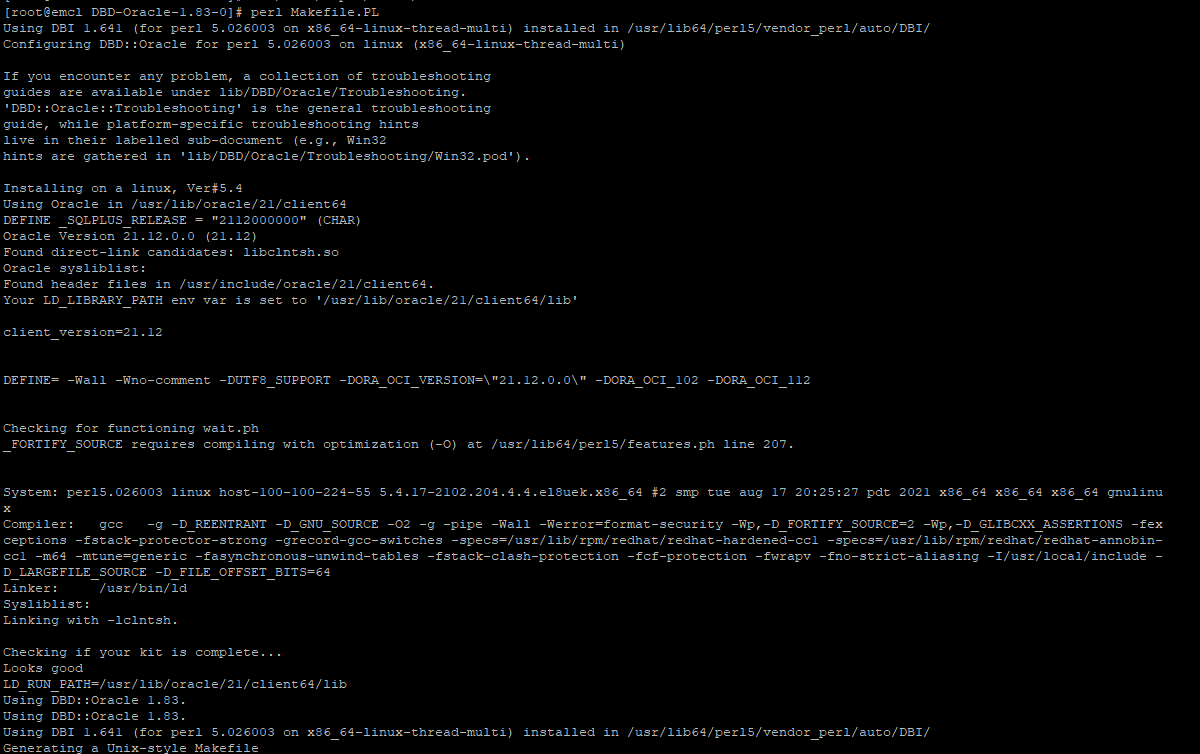
Then run the following
[root@emcl DBD-Oracle-1.83-0]# make [root@emcl DBD-Oracle-1.83-0]# make install
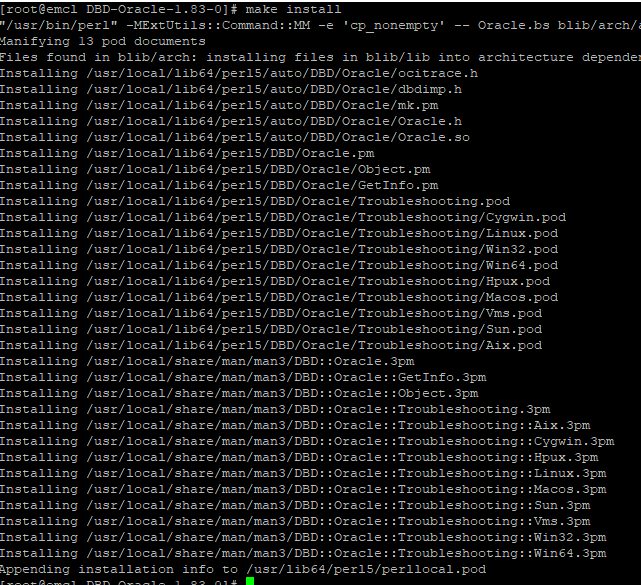
Verify installation using the following command.
[root@emcl DBD-Oracle-1.83-0]# perl -e 'use DBD::Oracle; print "DBD::Oracle is installed\n";' DBD::Oracle is installed
2. Download and Install check_oracle_health:
[root@emcl software]# cd /software/ [root@emcl software]# wget https://labs.consol.de/assets/downloads/nagios/check_oracle_health-3.3.2.1.tar.gz --2024-01-03 16:14:26-- https://labs.consol.de/assets/downloads/nagios/check_oracle_health-3.3.2.1.tar.gz Resolving labs.consol.de (labs.consol.de)... 94.185.89.33, 2a03:3680:0:2::21 Connecting to labs.consol.de (labs.consol.de)|94.185.89.33|:443... connected. HTTP request sent, awaiting response... 200 OK Length: 173953 (170K) [application/octet-stream] Saving to: ‘check_oracle_health-3.3.2.1.tar.gz’ check_oracle_health-3.3.2.1.tar.gz 100%[===================================================================>] 169.88K 721KB/s in 0.2s 2024-01-03 16:14:27 (721 KB/s) - ‘check_oracle_health-3.3.2.1.tar.gz’ saved [173953/173953] [root@emcl DBD-Oracle-1.83-0]# cd /software/ [root@emcl software]# tar xzf check_oracle_health-3.3.2.1.tar.gz [root@emcl software]# cd check_oracle_health-3.3.2.1 [root@emcl libexec]# ./configure -prefix=/usr/local/nagios -with-nagios-user=nagios -bash: ./configure: No such file or directory [root@emcl libexec]# cd /software/check_oracle_health-3.3.2.1 [root@emcl check_oracle_health-3.3.2.1]# ./configure -prefix=/usr/local/nagios -with-nagios-user=nagios
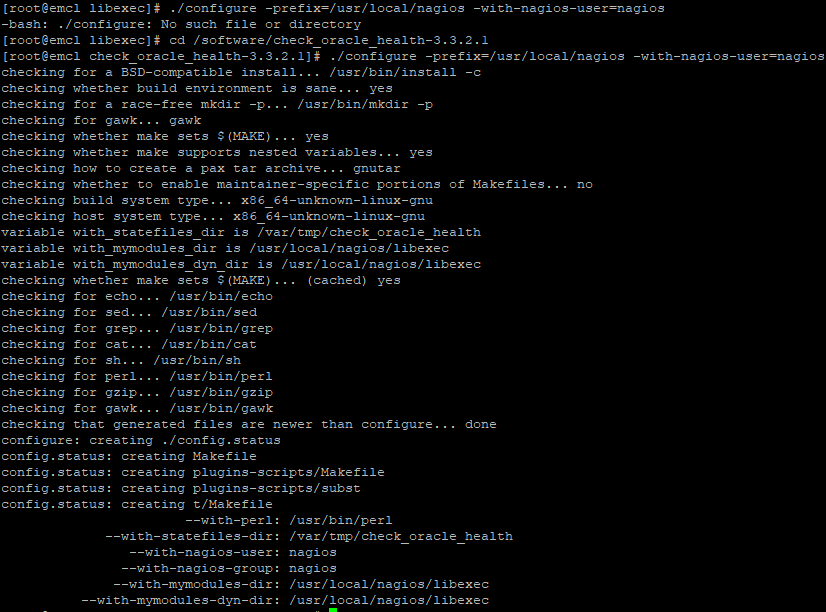
[root@emcl check_oracle_health-3.3.2.1]# make [root@emcl check_oracle_health-3.3.2.1]# make install
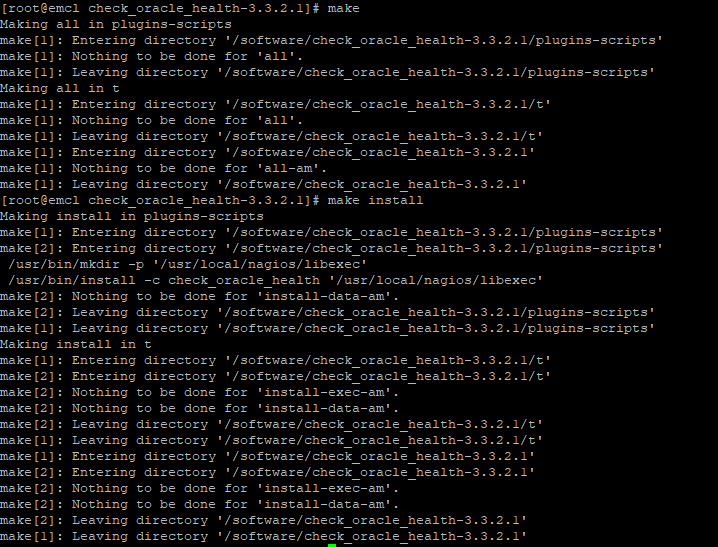
Here are some examples of testing the Check_Oracle_health
###checking the existance of check_oracle_health are created under /usr/local/nagios/libexec/ path [root@emcl check_oracle_health-3.3.2.1]# cd /usr/local/nagios/libexec/ [root@emcl libexec]# ll check_oracle check_oracle check_oracle_health [root@emcl libexec]# /usr/local/nagios/libexec/check_oracle_health -V check_oracle_health (3.3.2.1) This nagios plugin comes with ABSOLUTELY NO WARRANTY. You may redistribute copies of this plugin under the terms of the GNU General Public License. ##checking tnsping [root@emcl libexec]# /usr/local/nagios/libexec/check_oracle_health --connect=192.168.56.10:1521/pdb1.amir.net --username=nagios --password=nagios --mode tnsping OK - connection established to 192.168.56.10:1521/pdb1.amir.net. ##checking tablespaces usage [root@emcl libexec]# /usr/local/nagios/libexec/check_oracle_health --connect=192.168.56.10:1521/pdb1.amir.net --username=nagios --password=nagios --mode tablespace-usage OK - tbs USERS usage is 0.00%, tbs UNDOTBS1 usage is 0.03%, tbs TEMP usage is 0.00%, tbs SYSTEM usage is 0.84%, tbs SYSAUX usage is 0.81% | 'tbs_users_usage_pct'=0.00%;90;98 'tbs_users_usage'=1MB;29491;32112;0;32767 'tbs_users_alloc'=5MB;;;0;32767 'tbs_undotbs1_usage_pct'=0.03%;90;98 'tbs_undotbs1_usage'=9MB;29491;32112;0;32767 'tbs_undotbs1_alloc'=100MB;;;0;32767 'tbs_temp_usage_pct'=0.00%;90;98 'tbs_temp_usage'=0MB;265420;289013;0;294911 'tbs_temp_alloc'=1152MB;;;0;294911 'tbs_system_usage_pct'=0.84%;90;98 'tbs_system_usage'=276MB;29491;32112;0;32767 'tbs_system_alloc'=280MB;;;0;32767 'tbs_sysaux_usage_pct'=0.81%;90;98 'tbs_sysaux_usage'=264MB;29491;32112;0;32767 'tbs_sysaux_alloc'=280MB;;;0;32767 ##checking ASM disks [root@emcl ~]# /usr/local/nagios/libexec/check_oracle_health --connect=192.168.56.10:1521/pdb1.amir.net --username=nagios --password=nagios --mode asm-diskgroup-usage OK - dg DATA usage is 25.27%, dg FRA usage is 9.30% | 'dg_data_usage_pct'=25.27%;90;98 'dg_data_usage'=4140MB;14742;16052;0;16380 'dg_data_size'=16380MB 'dg_fra_usage_pct'=9.30%;90;98 'dg_fra_usage'=952MB;9212;10031;0;10236 'dg_fra_size'=10236MB
1. Configuration of Nagios server files including hosts.cfg, services.cfg and commands.cfg for checking tablespace usage
[root@emcl ~]# vi /usr/local/nagios/etc/hosts.cfg
## Default
define host{
use linux-box ; Inherit default values from a template
host_name src ; The name we're giving to this server
alias Oracle Linux Server release 7.9 ; A longer name for the server
address 192.168.56.10 ; IP address of Remote Linux host
}
##add this to the end of following file
[root@emcl admin]# vi /usr/local/nagios/etc/services.cfg
define service {
use generic-service
host_name src
service_description Oracle Tablespace Usage
check_command check_oracle_health_tablespace!1521!pdb1.amir.net!nagios!nagios!tablespace-usage
}
[root@emcl ~]# vi /usr/local/nagios/etc/objects/commands.cfg
define command {
command_name check_oracle_health_tablespace
command_line $USER1$/check_oracle_health --connect=$HOSTADDRESS$:$ARG1$/$ARG2$ --username=$ARG3$ --password=$ARG4$ --mode $ARG5$
}
2. Nagios configuration for tnsping
[root@emcl ~]# vi /usr/local/nagios/etc/services.cfg
define service {
use generic-service
host_name src
service_description TNS Ping
check_command check_oracle_health_tnsping!1521!pdb1.amir.net!tnsping
}
[root@emcl ~]# vi /usr/local/nagios/etc/objects/commands.cfg
define command {
command_name check_oracle_health_tnsping
command_line $USER1$/check_oracle_health --connect=$HOSTADDRESS$:$ARG1$/$ARG2$ --mode $ARG3$
}
3. Nagios configuration for ASM Diskgroup Free Space
[root@emcl ~]# vi /usr/local/nagios/etc/services.cfg
define service {
use generic-service
host_name src
service_description ASM Diskgroup Free Space
check_command check_oracle_health_asm_disk_used!1521!pdb1.amir.net!nagios!nagios!asm-diskgroup-usage
}
[root@emcl ~]# vi /usr/local/nagios/etc/objects/commands.cfg
define command {
command_name check_oracle_health_asm_disk_used
command_line $USER1$/check_oracle_health --connect=$HOSTADDRESS$:$ARG1$/$ARG2$ --username=$ARG3$ --password=$ARG4$ --mode $ARG5$
}
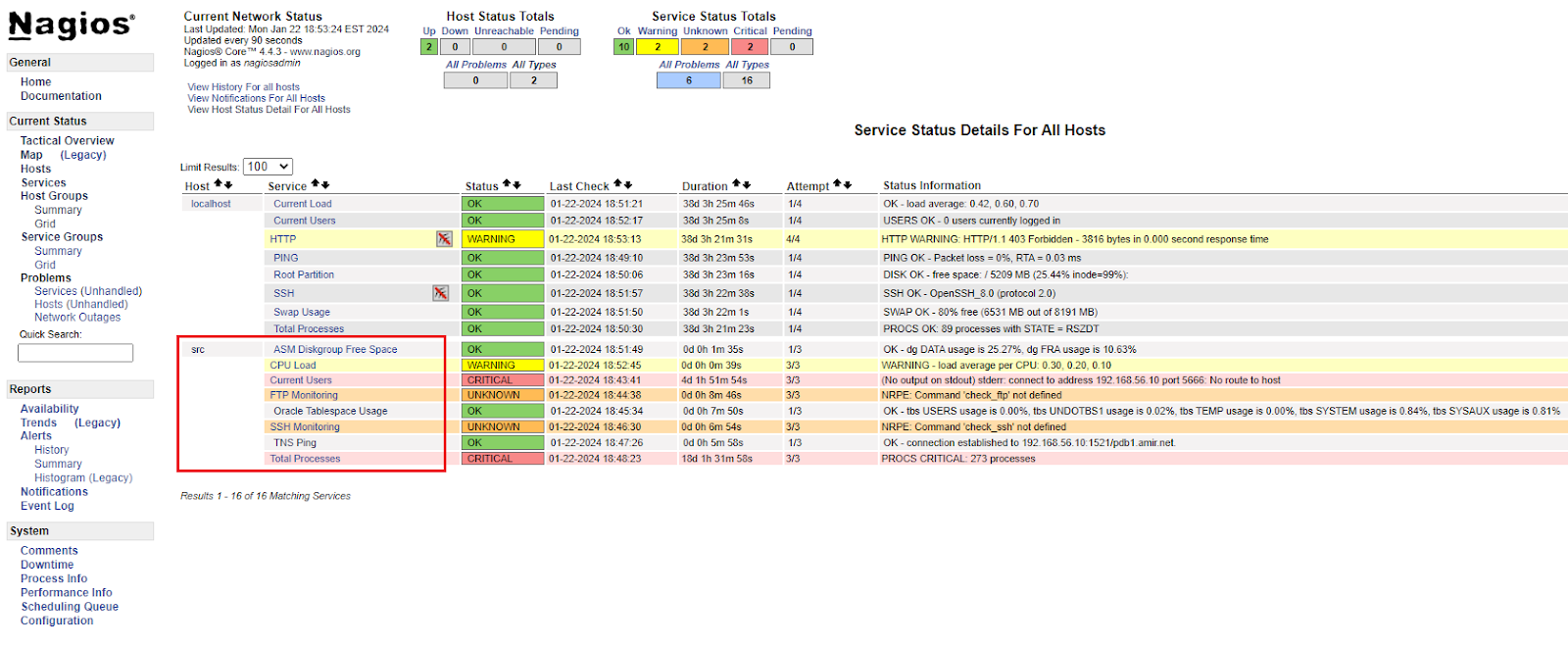
To configure Nagios to monitor a remote Windows host, you’ll need to set up NSClient++ on the Windows Machine. Install Nagios on the ... Read More
To monitor a remote Oracle Linux host using Nagios, we’ll need to install Nagios Plugins and NRPE (Nagios Remote Plugin Executor) on the remote ... Read More